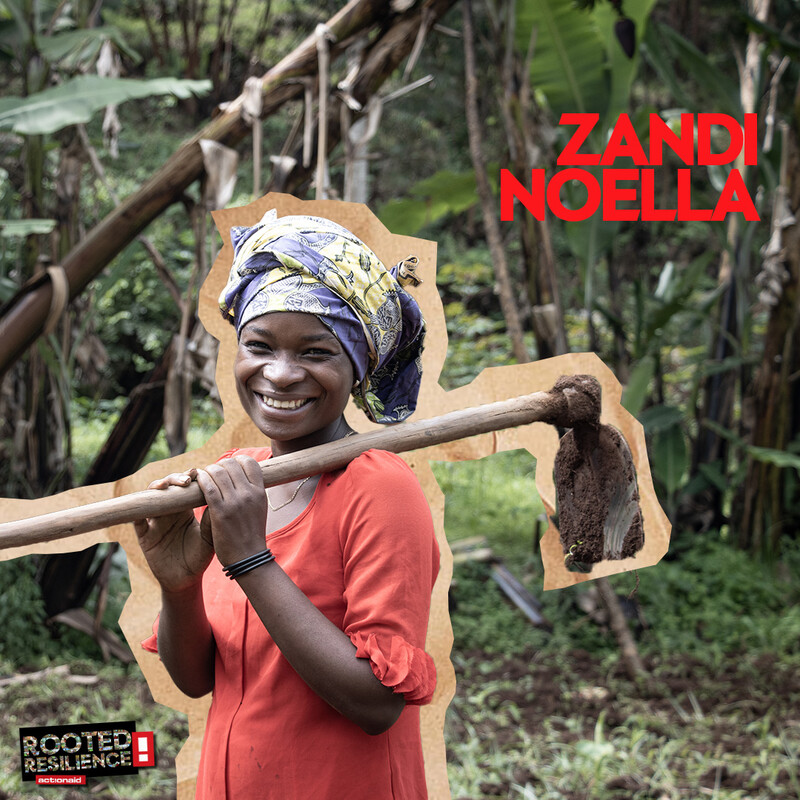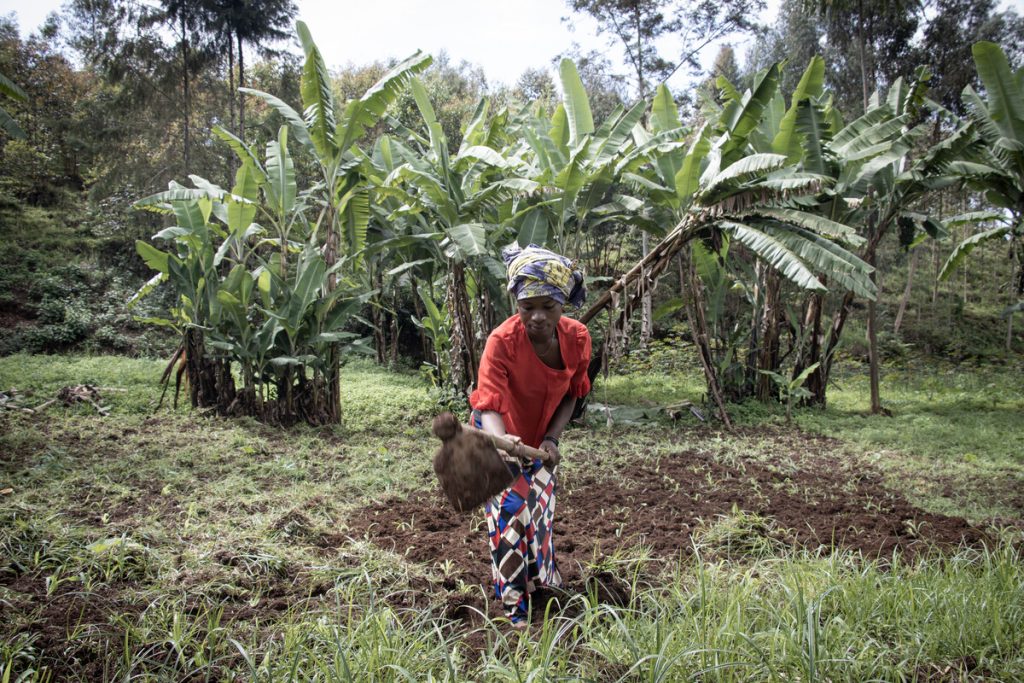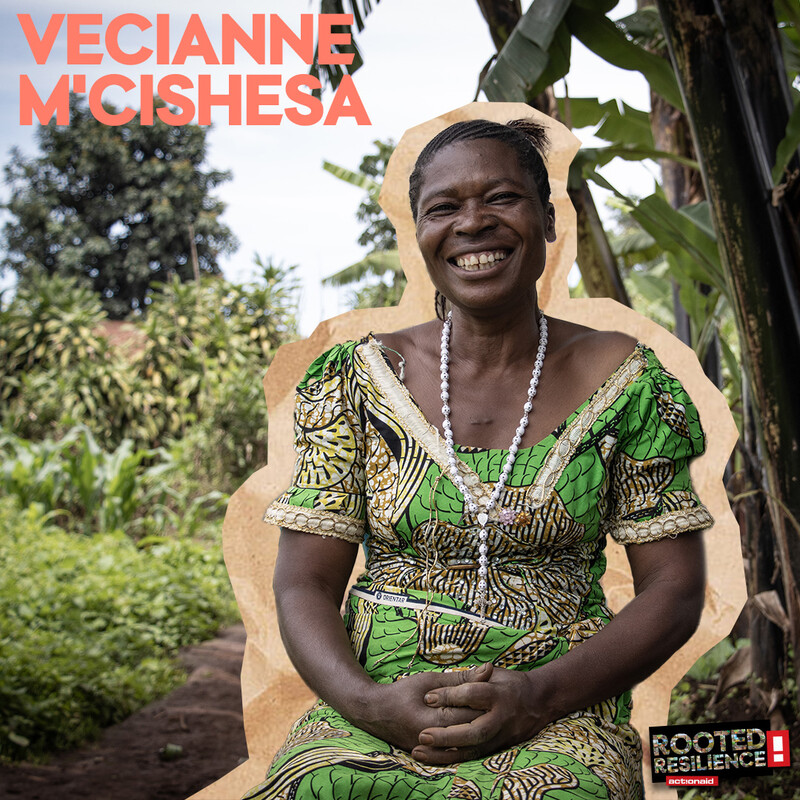Rooted Resilience, a yearlong project by ActionAid, aims to spotlight what women farmers can achieve for their communities when they have secure land rights, economic opportunities, and utilize agroecological practices in their farming.
In this second collection of stories, we are visiting with women ActionAid leaders, Zandi and Vecianne, who live in Central Africa’s Democratic Republic of the Congo (DRC). They share how they’re using agroecology to combat erosion and landslides in their farms and communities. They also call out the root causes behind these harmful environmental changes.
Once verdant, mountains and hills in the DRC now lay barren
The Congo Basin has suffered from centuries of timber exploitation. Networks of illegal logging operations clear massive amounts of forest by harvesting timber for charcoal production, palm oil, and rubber development. Industrial agriculture then establishes itself in the cleared forests, undermining sustainable local livelihoods and ecosystems.
Two of the negative impacts of deforestation in the DRC’s mountain and hill ecosystems have been erosion and landslides because there are less tree roots to stabilize soil and prevent it from moving during rain. To make matters worse, shifting weather patterns and more severe and frequent rainstorms caused by climate change have brought heavier rains to the region. Without healthy forests holding soil in place and slowing down the movement of water, farmers experience flooding events, which damage their homes and wipe out their crops.
For these reasons, farmers in the DRC say that the rains, which once gave life, are now a curse.
However, these women are tackling this problem head on by engaging in agroecological training provided by ActionAid, enabling them to adeptly combat the erosive threats to their crops and enhance their agricultural resilience.
Zandi’s story: using agroforestry to combat landslides

Photo: Esther N’sapu/ActionAid.
Zandi, a corn farmer and mother of five, has not enjoyed a good harvest of late. She spoke of the hardships faced by farmers like herself:
The rains are destroying everything. They destroy our fields and harvests, leaving us without food. There are days we are forced to sleep hungry. We plan to harvest during the dry season to save our harvests, but now the plants are drying up.
Through agroecological training, Zandi has learned about plants’ different physiological traits and how management practices can enhance crops’ tolerance of varying environmental conditions, like heavy rains or drought. Once strictly a corn farmer, she now grows sugar cane, which is more tolerant of short duration floods. She shares:
I learned how to plant sugar cane and with that [by selling it on the market], I was able to buy a goat and school supplies for children, they’ve had a great start to the new school year.”
The rain affects more than just her farms, seeping into her home, so even if she has food to cook for her family, she no longer has a clean and dry space to prepare their meals. She says that when this happens, her family often goes to bed hungry.
But Zandi is not one to surrender to despair.
We have learned that we must plant trees if we want to fix the problem. Unfortunately, most trees are cut down [by illegal logging operations] before they can mature, destroying the environment.

Zandi moving soil to plant trees near her farm. Photo: Esther N’sapu/ActionAid.
This technique of planting trees to improve the resilience of her farm is called agroforestry, which is a part of agroecology that intentionally integrates trees or shrubs into agricultural systems to prevent soil erosion, provide habitat for wildlife, pull carbon out of the atmosphere, and stop nutrient pollution.
Vecianne’s story: using agroecology to restore soil health
When strong storms destroyed Vecianne’s crops last year, she started applying agroecological strategies on her farm to help her build its resilience in the face of heavy rains and flooding.

Photo: Esther N’sapu/ActionAid.
This rain destroyed my crops. I had sowed beans in September, but it started raining and now the beans are damaged. I won’t harvest anything – absolutely nothing because of the rain.
She shared how agroecology practices, like using livestock manure to improve soil quality and installing fences to stabilize land and reduce erosion, are helping her to combat the negative impacts caused by heavy rains:
When I sow [plant] beans, I take the manure to the field, dig small holes, and I sow [plant] the beans. To cope with the erosion…I sow the seeds two weeks later and I set the pickets [woven, wooden fences] up so that the rain doesn’t ravage my beans.
She gets her manure from the goats, turkeys, and chickens she raises at home.
I store the manure in a bag for two weeks, then I take it to the field, and I plant the seedlings. The harvest is usually good enough to help me pay my children’s school fees.
ActionAid has developed a local awareness program to fight climate change impacts, including the onslaught of severe and catastrophic rainfall events, leading to devastating consequences such as floods and landslides. Through robust community empowerment programs centered on agroecological principles and environmental conservation, ActionAid equips local communities with the tools and knowledge necessary to resiliently confront these challenges head-on. Zandi, Vecianne, and countless other women in their community have not only found solutions to their immediate challenges, but a sense of agency and empowerment.
Eustache Masai, ActionAid DRC’s Acting Humanitarian Coordinator, sees agroecology as the solution:
Agroecology plays a key role in climate resilience, social justice and for agriculture production. It produces the best food. It prevents and cushions against climactic hazards and yield losses linked to landslides. It regenerates soil, promotes biodiversity, improves water quality, and fights against climate change.
As ActionAid, we are also advocating internationally to safeguard the trees planted by individuals like Zandi and Vecianne so that they can enhance their resilience against the imminent threat of illegal logging. Aligned with our multi-year Fund Our Future campaign, launched in September 2023, we are spearheading global climate justice activism through innovative research, impactful reporting, and coordinated civil society actions.
Central to our campaign is the promotion of agroecology as a sustainable solution to industrial agriculture, offering enhanced food security, reduced deforestation (particularly in countries like the DRC), protection against land grabs targeting smallholder farmers, and bolstering local and national economies
Stay tuned for the next installment of our Rooted Resilience series! In the meantime, check out our flagship report for our FundOurFuture campaign, How the Finance Flows, here.


